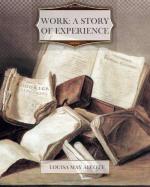“I told you so; God bless ’em both!” and Mrs. Wilkins retired precipitately to the hall, where she sat down upon the stairs and cried most comfortable tears; for her maternal heart was full of a thanksgiving too deep for words.
A sweet, secluded time to Christie, as she brooded over her little treasure and forgot there was a world outside. A fond and jealous mother, but a very happy one, for after the bitterest came the tenderest experience of her life. She felt its sacredness, its beauty, and its high responsibilities; accepted them prayerfully, and found unspeakable delight in fitting herself to bear them worthily, always remembering that she had a double duty to perform toward the fatherless little creature given to her care.
It is hardly necessary to mention the changes one small individual made in that feminine household. The purring and clucking that went on; the panics over a pin-prick; the consultations over a pellet of chamomilla; the raptures at the dawn of a first smile; the solemn prophecies of future beauty, wit, and wisdom in the bud of a woman; the general adoration of the entire family at the wicker shrine wherein lay the idol, a mass of flannel and cambric with a bald head at one end, and a pair of microscopic blue socks at the other. Mysterious little porringers sat unreproved upon the parlor fire, small garments aired at every window, lights burned at unholy hours, and three agitated nightcaps congregated at the faintest chirp of the restless bird in the maternal nest.
Of course Grandma grew young again, and produced nursery reminiscences on every occasion; Aunt Letty trotted day and night to gratify the imaginary wants of the idol, and Christie was so entirely absorbed that the whole South might have been swallowed up by an earthquake without causing her as much consternation as the appearance of a slight rash upon the baby.
No flower in David’s garden throve like his little June rose, for no wind was allowed to visit her too roughly; and when rain fell without, she took her daily airing in the green-house, where from her mother’s arms she soon regarded the gay sight with such sprightly satisfaction that she seemed a little flower herself dancing on its stem.
She was named Ruth for grandma, but Christie always called her “Little Heart’s-ease,” or “Pansy,” and those who smiled at first at the mother’s fancy, came in time to see that there was an unusual fitness in the name. All the bitterness seemed taken out of Christie’s sorrow by the soft magic of the child: there was so much to live for now she spoke no more of dying; and, holding that little hand in hers, it grew easier to go on along the way that led to David.
A prouder mother never lived; and, as baby waxed in beauty and in strength, Christie longed for all the world to see her. A sweet, peculiar, little face she had, sunny and fair; but, under the broad forehead where the bright hair fell as David’s used to do, there shone a pair of dark and solemn eyes, so large, so deep, and often so unchildlike, that her mother wondered where she got them. Even when she smiled the shadow lingered in these eyes, and when she wept they filled and overflowed with great, quiet tears like flowers too full of dew. Christie often said remorsefully:




